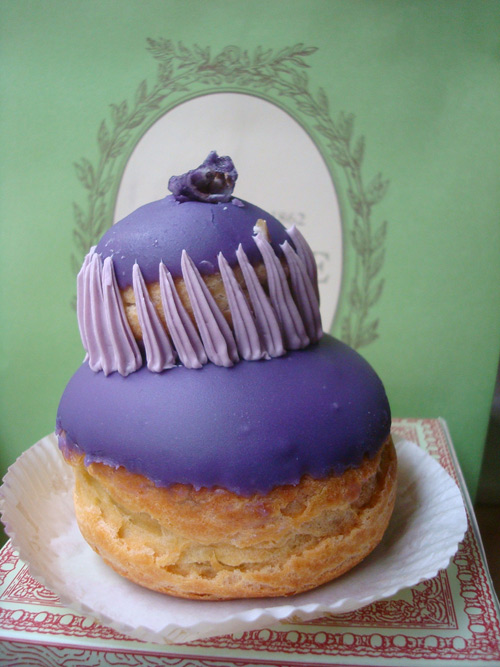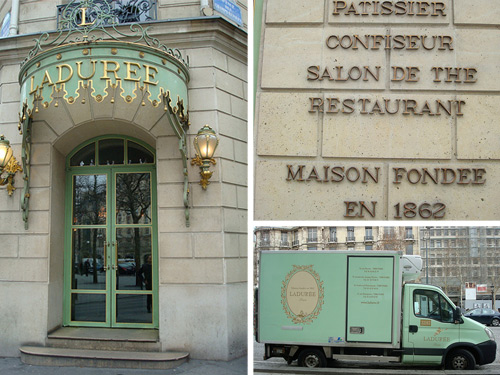 Walking into Laduree in Paris is a bit like walking into Tiffany or Cartier: it is one of those supremely luxurious places that has the ability to make you feel fancy by simply walking through the door.
Walking into Laduree in Paris is a bit like walking into Tiffany or Cartier: it is one of those supremely luxurious places that has the ability to make you feel fancy by simply walking through the door.
 Laduree's Champs-Elysees Location, complete with Ladureemobiles!Of course, while both are luxury brands, buying a few of the delights spun from sugar at Laduree is far more reasonable to the typical shopper than shelling out cash for something silver (or gold, or platinum, or diamond-studded) from Tiffany.
Laduree's Champs-Elysees Location, complete with Ladureemobiles!Of course, while both are luxury brands, buying a few of the delights spun from sugar at Laduree is far more reasonable to the typical shopper than shelling out cash for something silver (or gold, or platinum, or diamond-studded) from Tiffany.
Not only is it a delightful place to visit, but it's an important landmark in the world of pastry: founded in 1862, the cafe pioneered the concept of the salon de thé. Per the Laduree site:
Under the Second Empire, cafes developed and became more and more luxurious. They attracted Parisian high society. Along with the chic restaurants around the Madeleine, they became the showcases of the capital.
The beginning of this century found Paris wrapped up in a frenzy of distraction and going out in public. Parisians flocked to the Universal Exposition. Women were also changing. They wanted to make new acquaintances. Literary salons and literature circles were outmoded.
Ernest Ladurée’s wife, Jeanne Souchard, daughter of a well-known hotelier in Rouen, had the idea of mixing styles: the Parisian café and pastry shop gave birth to one of the first tea salons in town. The “salon de thé” had a definite advantage over the cafés: they permitted ladies to gather in freedom. Jeanne Souchard succeeded in combining the turn-of-the-century trend to modernism with knowledge of the merits of a craft transmitted by her family.
So you can probably see why visiting Laduree is one of those pivotal pastry experiences that every sweet tooth should experience at least once (even if the company which now owns it, Holder, is responsible for putting macarons in French McDonalds too).
 While they are perhaps best known for their macarons, on this visit, I had my eye not on the little sweetburgers but on their iconic and infinitely lovely religieuse.
While they are perhaps best known for their macarons, on this visit, I had my eye not on the little sweetburgers but on their iconic and infinitely lovely religieuse.
A religieuse is a pastry which is said to take its name from its resemblance to a nun's habit--but being composed of choux pastry filled with thick custard and topped with delicate and pretty icing with buttercream piping on the sides, some harcore pastry lovers might argue that the name stems from its taste, which approaches an absolutely religieuse experience.
And at Laduree, they have a few different flavors; we chose the intriguing Blackcurrant-Violet, which is described as "Choux pastry, blackcurrant & violet flavoured confectioner’s custard."
 As a general rule, I am not a huge fan of lavender or rose-infused pastries, which I feel often can err toward tasting a bit perfumey. However, if there is one that could turn me around, this would probably be it: while assertively flavored, the violet flavor is beautifully done: buttery and floral and full. But like I said, it's powerful--I don't think I could polish one of these off in the same way that I might attack, say, a chocolate variety, but it sure was a delight to share and savor with others (we shared it among a group of four).
As a general rule, I am not a huge fan of lavender or rose-infused pastries, which I feel often can err toward tasting a bit perfumey. However, if there is one that could turn me around, this would probably be it: while assertively flavored, the violet flavor is beautifully done: buttery and floral and full. But like I said, it's powerful--I don't think I could polish one of these off in the same way that I might attack, say, a chocolate variety, but it sure was a delight to share and savor with others (we shared it among a group of four).
But as always, it was a delight to visit Laduree. Next on my list to try there, though? The Marie-Antoinette, an exquisitely appointed little cake...or maybe the mont blanc?
 Laduree has various locations in Paris and beyond; for locations and more information, visit laduree.fr. And as a P.S., if you want to try making your own religieuse pastries, why not check out this excellent post on Not Quite Nigella?
Laduree has various locations in Paris and beyond; for locations and more information, visit laduree.fr. And as a P.S., if you want to try making your own religieuse pastries, why not check out this excellent post on Not Quite Nigella?
